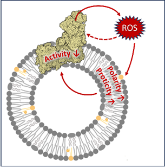Mechanistic insights into respiratory complex I and the fate of the ROS it produces from EPR spectroscopy
Thursday 13 June 2024, 1.00PM
Speaker(s): Dr Maxie Roessler (Imperial College London)
Unpaired electrons play an important role in numerous electron transfer processes in biology. Controlling their location and exploiting the interactions with their environment can provide key mechanistic information into these processes.

In this talk, I will discuss some insights that pulse EPR has brought to understanding how respiratory complex I (R-CI), an essential enzyme in the mitochondrial electron transport chain, functions. R-CI is also a major source of reactive oxygen species (ROS), which are implicated in neurodegenerative diseases and ageing. While the mechanism of ROS production by R-CI is well-established, the feedback of ROS on R-CI activity is poorly understood. EPR spectroscopy on R-CI incorporated in artificial membrane vesicles reveals that ROS reduce R-CI activity by making the membrane more polar and by increasing its hydrogen bonding capability, rather than through the commonly thought mechanism of lipid peroxidation.
Moreover, the mechanism that we have uncovered reveals that the feedback of ROS on R-CI activity via the membrane is transient and not permanent. Our successful use of modular proteoliposome systems in conjunction with EPR spectroscopy and other biophysical techniques will constitute a powerful approach for investigating ROS effects on other membrane proteins.
Location: Department of Chemistry and Centre for Pulse EPR Spectroscopy, Imperial College London. Molecular Sciences Research Hub, London W12 0BZ
